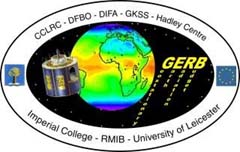Dataset
GERB-2: Level 2 High resolution (L2hr) top of atmosphere radiance and flux data
Abstract
The Geostationary Earth Radiation Budget (GERB-2) Level 2 High Resolution (L2HR) dataset contains accurate measurements of the Earth Radiation Budget. Broadband measurements of earth-leaving radiances are made from which the emitted thermal and reflected solar components of the Earth Radiation Budget are derived. These data are available at a time resolution of 15 minutes for the region 60E to 60W, 60N to 60S and area are ideal for studying fast variations in the radiation budget such as those associated with changing cloud conditions, aerosol events and the diurnal cycle. Time and pixel centres matched with METEOSAT imager SEVIRI.
The level 2 HR (High Resolution) data are resolution enhanced snapshots of the top of atmosphere radiances and fluxes every 15 minutes. They are provided at the product acquisition time of the METEOSAT narrowband SEVIRI imager on a fixed equal viewing angle grid matched to 3x3 SEVIRI pixel grid-boxes. This gives the HR product a temporal resolution of 15 minutes and a grid spacing of 9 km at the sub-satellite point. The time in the product name is the same as the SEVIRI product name time. Instantaneous accuracy at the HR scale is expected to be lower than for the lower spatial resolution GERB products as additional noise is introduced by the resolution enhancement, particularly for very inhomogeneous scenes and extreme angles. However, the HR product is recommended as the basis for users wishing to create custom averages over time and space and its production ensures that after appropriate averaging its accuracy is commensurate with the other GERB products
The GERB instrument was specifically designed to be mounted on a geostationary satellite and was carried onboard the Meteosat Second Generation satellite operated by European Organisation for the Exploitation of Meteorological Satellites (EUMETSAT). The first GERB instrument, GERB-2, was onboard Meteosat Second Generation satellite, MSG-1, and covers the period March 2004 to May 2007.
Users must read the quality summary associated with these data and will find details of user applied correction that are recommended to be applied to these datasets before using. Please cite Harries et al., 2005: The Geostationary Earth Radiation Budget Project, Bull. Amer. Meteorol. Soc., Vol. 86, 945-960, doi: 10.1175/BAMS-86-7-945.
Details
| Previous Info: |
No news update for this record
|
|---|---|
| Previously used record identifiers: |
No related previous identifiers.
|
| Access rules: |
Access to these data is available to any registered CEDA user. Please Login or Register for a CEDA account to gain access.
Use of these data is covered by the following licence(s): http://www.nationalarchives.gov.uk/doc/open-government-licence/version/3/ When using these data you must cite them correctly using the citation given on the CEDA Data Catalogue record. |
| Data lineage: |
Data collected by the GERB instrument onboard the Meteosat Second Generation satellite operated by European Organisation for the Exploitation of Meteorological Satellites (EUMETSAT), then the data processed at RMIB (Royal Meteorological Institute of Belgium) then sent to CEDA by the GERB team at Imperial College and RAL (Rutherford Appleton Laboratory). |
| Data Quality: |
Users must read the quality summary associated with these data and will find details of user applied correction that are recommended to be applied to these datasets before using.
|
| File Format: |
Data are HDF formatted
|
Process overview
Instrument/Platform pairings
| Geostationary Earth Radiation Budget Experiment 2 (GERB-2) | Deployed on: Meteosat Second Generation 1 (MSG-1) or METEOSAT-8 |
Mobile platform operations
| Mobile Platform Operation 1 | Mobile Platform Operation for: Meteosat Second Generation 1 (MSG-1) or METEOSAT-8 |
Computation Element: 1
| Title | Meteosat Second Generation 1 (MSG-1) or METEOSAT-8 |
| Abstract | Deployed on Meteosat Second Generation 1 (MSG-1) or METEOSAT-8. Launched on 28 August 2002, the first Meteosat Second Generation (MSG) satellite became operational on 29 January 2004, when it was redesignated Meteosat-8. Since then it has continuously returned highly detailed imagery of Europe, the North Atlantic and Africa every 15 minutes, for operational use by meteorologists. MSG-1 has a nominal lifetime of seven years. |
| Input Description | None |
| Output Description | None |
| Software Reference | None |
| Output Description | None |
- long_name: Longwave Radiation
- gcmd_url: http://vocab.ndg.nerc.ac.uk/term/P141/4/GVAR0482
- gcmd_keyword: Longwave Radiation
- names: Longwave Radiation, http://vocab.ndg.nerc.ac.uk/term/P141/4/GVAR0482
- long_name: Shortwave Radiation
- gcmd_url: http://vocab.ndg.nerc.ac.uk/term/P141/4/GVAR0755
- gcmd_keyword: Shortwave Radiation
- names: Shortwave Radiation, http://vocab.ndg.nerc.ac.uk/term/P141/4/GVAR0755
Co-ordinate Variables
Temporal Range
2004-03-31T23:00:00
2007-05-31T22:59:59
Geographic Extent
60.0000° |
||
-60.0000° |
60.0000° |
|
-60.0000° |

